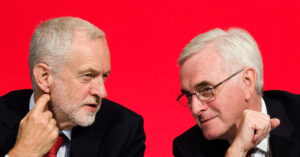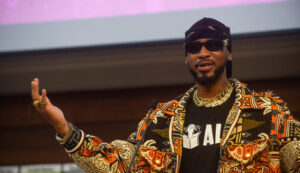For decades, the North East was home to the right sort of Left. Durham, Tyneside — these are places rich in labour history and heraldry, ancient seedbeds of a working-class trade unionism which predates the Labour Party itself. But, though always radical, these areas were first and foremost loyal. In their battles with the militant miners’ federations in the Eighties, Labour leaders could rely on staunch backing from the powerful anti-communist leaders of the Durham area. In 1983, when local Labour parties were dominated by the Left, Tony Blair found a safe haven in Sedgefield, while a decade later his friend Peter Mandelson was picked for Hartlepool. Regional bosses of the local T&G and GMB unions would regularly secure seats for fellow Blairites such as Stephen Byers and Alan Milburn.
Yet for weeks now, local members of the Labour Party have been in open revolt against their leadership. Jamie Driscoll, the Labour mayor of the North of Tyne, has been blocked from standing as its candidate for a new mayoralty which will cover most of the area, from Durham to Northumbria. Administratively, this may seem like a minor regional snub. But it was Driscoll, a former engineer, who led the negotiations by local council leaders to secure the impressive £1.4 billion devolution settlement to establish the authority in the first place. It was just one victory among many in his current role: he’s created thousands of new jobs, extended rural broadband, and, unlike in the neighbouring Teesside Valley, has seen off the Tory threat.
It seems churlish, then, of the Labour high command to allow the leading architect of this new post stand for it. Starmer’s close ally, Baroness Jenny Chapman — best known for her role in Labour’s defeat in the 2021 Hartlepool by-election — has said Driscoll’s exclusion was “simply guaranteeing the highest quality candidates”. Everyone, however, knows it’s because of Driscoll’s reputation as the “last Corbynista in power”, a provincial leftover from that era of turmoil and defeat which Keir Starmer is desperate to forget. But this time, he seems to have miscalculated; this time, there’s talk that Starmer’s “purges” have finally gone too far.
It is true that Driscoll was backed by Momentum and by Left-wing unions such as Unite. But when Driscoll last stood, these were endorsements for a Labour candidate, not shameful baggage. The Greater Manchester mayor Andy Burnham supported him too, on the basis of his existing record as mayor, and Burnham is no rabid Marxist, no “enemy within”. It has been said that Driscoll’s proximate crime had been to interview the socialist film director Ken Loach in an event at a local theatre four months ago. (Loach was expelled from the Labour Party in 2021 for refusing to disown Labour members who had been expelled for alleged antisemitism.) But Driscoll’s discussion with Loach was a cultural event, not political, and made sense given that Loach has set two of his most recent films on Tyneside, including I, Daniel Blake, which won the Palme d’Or.
In any case, Keir Starmer himself has even stronger links with Loach. His film on the celebrated McLibel case included substantial footage of the young Starmer who worked on the case, in the days when he was nothing more than a fanciable young barrister who fought for free speech and human rights. And, if it’s the Corbyn era that Driscoll is being shamed for, Starmer himself is far from innocent. Even if he’s made the successful swerve from “Jeremy Corbyn is my friend” to “we were never friends”, some of us couldn’t bear the whiplash. The two statements can’t both be true. And there is a sheen of inconsistency and disingenuousness which now taints Starmer’s leadership — and arguably his entire project in the Party.
Only this week, an Asian member of Labour’s National Executive Committee [NEC], Mish Rahman, was barred from the selection to become a candidate in Wolverhampton South West. Rahman, a Momentum supporter, believes he upset Starmer by voting against the disciplinary structures introduced after the Equality and Human Rights Commission’s report on antisemitism in the party. And yet, just last September, Starmer was pictured presenting Rahman with flowers and a certificate in recognition of his service on the NEC (the photo adorns Rahman’s Twitter site). What’s more, as an NEC member, Rahman has chaired a couple of the party panels that have drawn up selection longlists in other seats — exactly the same type of panel which excluded him. If he was fit to chair such panels, Rahman quite reasonably asks, why is he unfit to be on a longlist himself?
Even people on the Right of the party feel Labour is being far too authoritarian. It was reported this week that when Starmer defended his decision to stick with the government’s two-child benefit cap, nobody in the Shadow Cabinet dared to challenge him, presumably for fear of reprisals. And the relentless ideological moderation has fulfilled every Left-wing stereotype of Starmer as a ruthless politic cynic, “laser-focused” (to use a Starmer cliché) on power but never change.
The case of Driscoll has extended this hostility from Corbynite liabilities to anyone with a strong commitment to trade unionism. Today, even having a working-class background seems to be regarded as suspect, in a party where the leadership has allowed selection processes to become dominated by outside agencies which charge contenders thousands of pounds to advise their campaigns. And they wholeheartedly believe this is a winning strategy. One of Starmer’s henchmen, Luke Akehurst, happily admitted to me that potential candidates are chosen not on quality, but politics. Anticipating a slim majority after the next election, he argued, Labour cannot afford dissidents who might rebel against official policy.
Strong, self-confident leaders welcome internal debate, while weak leaders who lack confidence are terrified of opposition. When John F. Kennedy won the 1960 presidential election, he sought out the “best and the brightest” to join his Camelot administration. And truly great leaders relish having people around them who will generate fresh ideas and challenge existing thinking. A hundred years before JFK, Abraham Lincoln famously constructed his cabinet as a “team of rivals”. In the UK, Margaret Thatcher loved a good barney in Downing Street, and admired underlings who debated with her. Clement Attlee regarded himself as a primus inter pares, and thrived on having four major figures in his Cabinet — Herbert Morrison, Ernest Bevin, Stafford Cripps and Aneurin Bevan. Attlee skilfully orchestrated their abilities and ambitions to produce the greatest peacetime government of the last century. But, more than even the New Labour era, senior Starmer ministers look set to be side-lined. Power will reside with a small group of individuals whose names mean nothing to the general public.
Jamie Driscoll represents a new breed of regional lieutenant that Starmer should be encouraging. His background as an engineer, and director of a software company, could have been assets to his party. Instead, he is now a martyr, a permanent memory of ruthless mismanagement. Since announcing his independent candidacy, he has already raised more than £100,000 towards his crowd-funding target of £150,000. When he stands, he will badly divide Labour in the once ultra-loyal North East — another heartland which may no longer recognise its historic party. And symbolically he threatens party unity nationwide, even if, as widely expected, Labour wins all three by-elections today.
In popular discourse, Starmer is widely thought to be descended from Blair, while Jamie Driscoll personally compares his situation to Ken Livingstone’s back in 2000. And, when Blair spoke to Starmer this week at his Future of Britain conference, he should have reminded him of how he managed his own rebellious regional mayor. Ahead of the inaugural mayoral election in London, Blair had very publicly denounced Livingstone’s bid to become Labour candidate, dismissing him despite his local loyalties and socialist roots. It was a decision Blair later regretted: Livingstone quit the party and trounced Blair’s stooge candidate, Frank Dobson, into a humiliating third place. Recognising his error, Blair later had to allow the popular Livingstone into the party, and backed him in the following mayoral contest in 2004.
In his quest to sanitise Labour’s brand, Starmer’s diktats have worked like pure alcohol, cleansing only as much as they corrode. He believes that he is operating within Labour’s established traditions: Wilson and, of course, Blair were known as ruthless, determined manoeuvrers. But they both understood that Labour leans on several pillars — including its unions links, its idealism and its localism. Somewhere on the road from London to the North East, there is a pit stop where the Durham Miners’ Gala can break bread with the Islingtonian cadres. At this rate, neither will bother to make the journey. And, come 2024, the worst fate for Starmer will be making his victory speech to an empty hall.
Disclaimer
Some of the posts we share are controversial and we do not necessarily agree with them in the whole extend. Sometimes we agree with the content or part of it but we do not agree with the narration or language. Nevertheless we find them somehow interesting, valuable and/or informative or we share them, because we strongly believe in freedom of speech, free press and journalism. We strongly encourage you to have a critical approach to all the content, do your own research and analysis to build your own opinion.
We would be glad to have your feedback.
Source: UnHerd Read the original article here: https://unherd.com/



